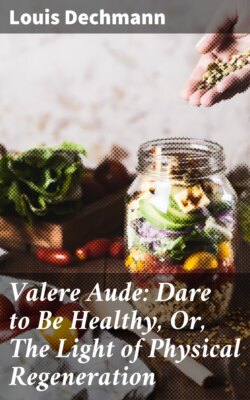Читать книгу Valere Aude: Dare to Be Healthy, Or, The Light of Physical Regeneration - Louis Dechmann - Страница 10
На сайте Литреса книга снята с продажи.
HYMN OF HEALTH
ОглавлениеTable of Contents
(From the Greek)
Health, thou most frangible of heaven's dower,
With thee may what remains of life be spent;
Cease not upon me, thus, thy gifts to shower,
And in my soul to find a tenement.
For what is there of beauty, wealth or power,
Of gentle offspring, or the wiles of love,
But owes its solace, sweet, in every hour,
To thee, thou regent of the powers above.
The spring of pleasure blooms if thou but bless,
And every step upon the Autumn way
Is lit by thee, parent of happiness!
Without thee sadly sounds life's roundelay.
(M.B.)
Health is one of those intangible inestimably precious possessions, like life and liberty, to which all are entitled by natural Law. Yet are there but few who are careful to conserve this priceless heritage. It is a boon all too often unappreciated until lost, and once lost, it may not always be regained, though intense be our regrets and our endeavours exhaust the field of human resource.
Again, although the possession of passable health may be ours, it is a condition rarely totally untroubled and continuous and, therefore, cannot be correctly classified as perfect health.
These simple definitions may seem to the reader trite and trivial; but how many of us, let me ask, give thought to their vital vast significance.
Never to need a physician; ever to be unconsciously guarded against all access of disease; to maintain the fair form and vigor of the body without effort, so that no depleting influences can find a hold; this is the health ideal by nature set, the standard to which the earliest progenitors of our race may doubtless have conformed, but upon which succeeding generations have sedulously turned their backs.
Philosophers have defined this physically perfect state.
Historians have immortalized it in heroic tomes.
Poets have extolled it in great epic verse.
Artists have depicted it in portraiture and tapestry.
Sculptors have expressed it in the life-like stone.
The sick have longed for it.
Saints have prayed for it and, in the search for its fabled, false elixir, alchemists have sacrificed their lives. It remained for the smug, "sober judgment" of our day to pronounce it "unattainable"—unattainable!
This, however, is a matter of small moment; for, as Whittier reminds us: "The falsehoods which we spurn today were the truths of long ago"—and although men part reluctantly with favorite—and lucrative—fallacies, and "Faith, fantastic Faith, once wedded fast to some dear falsehood, hugs it to the last," nevertheless this false belief, like so many other sapient pronouncements of human wisdom, must be subjected to final reversal.
The ideal state of health is, truly, "unattainable" when we refuse to yield obedience to the simple laws of nature—when we continuously persist in interference with her work and embarrass her with artificial substitutes, defying her august hygienic precepts by our manner of life.
Not so, however, if we yield to her inducements, fulfil her requirements, and submit ourselves freely to her unerring will.
There is less of fault than of weakness in the fact that so many of us fail to give nature the opportunity to rear us as healthy men and women, to keep us more free than we are from suffering and disease.
Her ways are ways of pleasantness and follow on the lines of the veriest simplicity.
The preservation of health must needs, then, move along these self-same simple lines.
It is ignorance, in most cases, rather than unwillingness that brings upon the race the punishment we call disease.
But how can they be expected to learn who have no teacher? And how can they teach who are themselves untaught?
It is incumbent upon those who have acquired knowledge to impart life-saving truths, and there is no greater benefactor of his kind than he who reduces life's problems to their simplest terms.
"He that dwelleth in the secret place of the Most High shall abide under the shadow of the Almighty." Such is the dictum of King David, the psalmist, as expressed in the Hebrew Scriptures.
All that man's intellect can conceive of the Almighty is bounded by its expression in Nature.
It is neither arrogant, nor irreverent, then, to claim with reasonable confidence that the devoted service of long years of close application to research in Nature's secret dwelling-place may entitle such an one to share the guidance of the Almighty mind and inspire him to share its favours with his fellow man.
This then, the Author of this brochure, realizing vividly and with sympathy, humanity's sore need, has been constrained to formulate, for the benefit of those desirous to learn;—a means of enlightenment suitable and accessible to all. For although, to quote from Goethe, whose transcendent mind was almost omniscient in all mundane things:
"Allwissend bin ich nicht; doch viel ist mir bewusst."
(Omniscient am I not, though much I know.)
Yet "Unity is strength," and in conjunction with associated minds, such knowledge as I have may amply suffice to save many a sad sufferer from hereditary doom.
The scheme, or, to be more explicit, the Club, I purpose to inaugurate, is fully expounded in detail in the succeeding pages.
